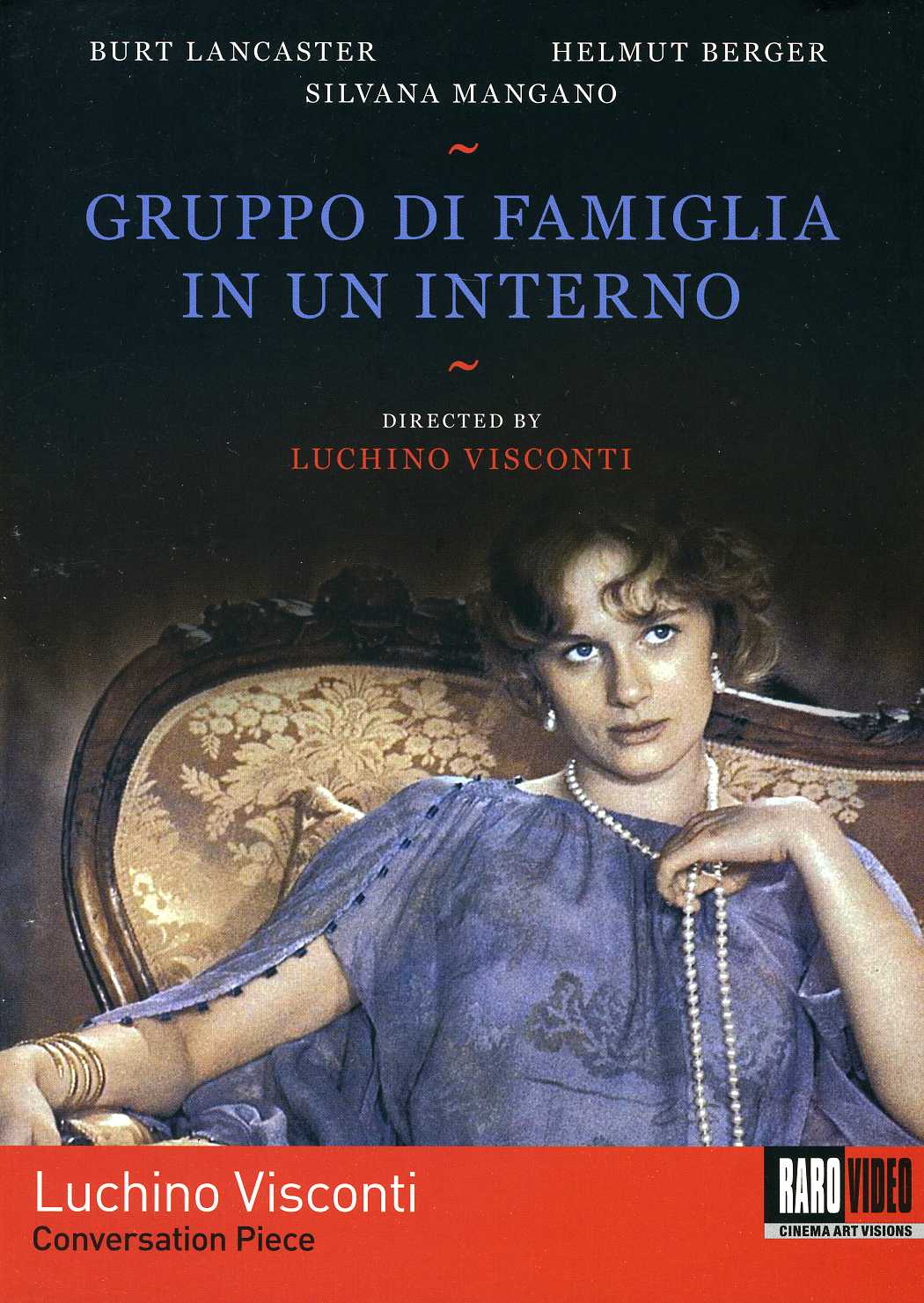
Conversation Piece
Director - Luchino Visconti
Cast - Burt Lancaster, Helmut Berger
Country of Origin - Italy
Discs - 1
Distributor - Raro Video
Reviewer - Bobby Morgan
The Film: 4/5
An American professor of art history (Burt Lancaster) has retired and spends his time in semi-seclusion in his multi-storied house in Rome. One eventful day he is approached by the impulsive and tempestuous noblewoman Marchesa Bianca Brumonti (Silvana Mangano) about renting the upstairs apartment the professors was planning on turning into his personal library. After convincing him to lease the apartment to her for one year she and her three companions - her daughter Lietta (Claudia Marsani), son Stefano (Stefano Patrizi) and young kept lover Konrad (Helmut Berger) - quickly move in. Within days they are commencing extensive renovation on the apartment and testing the professor’s patience with the noise they create. Eventually he begins to warm up to the Brumonti family and even forges a bond with the tormented Konrad over their mutual admiration for art and classical music. But the professor is reluctant to come out of his self-imposed emotional exile, and when Konrad’s criminal activities come back to haunt him the family’s revelation of their illicit secrets threaten to send the professor back into his sheltered existence for all time.
It was more than two decades ago when I started reading the print movie reviews of Roger Ebert in his annual Video Home Companion. Before I had my first job and earned enough money to buy editions I would check them out from the public library and read through them voraciously. In several of his reviews Ebert was fond of using a quotation from the great English novelist E.M. Forster, “Only connect.” The quote is taken from Forster’s 1910 book Howard’s End, the basis for the 1992 Merchant-Ivory film of the same name. To my knowledge Ebert has never used the full quote in his review so here it is:
“Only connect! That was the whole of her sermon. Only connect the prose and the passion, and both will be exalted, and human love will be seen at its height. Live in fragments no longer. Only connect, and the beast and the monk, robbed of the isolation that is life to either, will die.”
Luchino Visconti’s film Conversation Piece is about the kind of people who would do well to heed Forster’s words. The Professor and the Brumonti clan live in fragments, divided by their passions and flaws yet united by their longing to be part of a real family, only to fail miserably because they are still too fragile and embittered to see beyond the mistakes they have made in the pursuit of status and comfort. It was the great Italian filmmaker’s next-to-last feature before he died of a heart attack in March 1976, but it might as well have been his last because Conversation Piece is the culmination of his brilliant directing career. It was also one of the least technically challenging films Visconti ever made; after suffering a stroke several years prior he could no longer oversee elaborate location shoots and epic battle scenes, so the director was compelled to make Conversation Piece a complete interior film. Every scene takes place inside the professor’s expansive home, and since there are many visually interesting rooms of impressive size in the house the action never feels confined and stagy, though the story is structured very much like a stage play. Credit for that must go to Visconti’s assured direction, the sumptuous cinematography by Pasqualino De Santis, the crafty editing work done by Ruggero Mastroianni, and the amazingly detailed production design by Mario Garbuglia.
Although Visconti denied it at the time, Conversation Piece is possibly his most autobiographical film. It has been suggested that Burt Lancaster’s character was modeled after the director, said to be a lonely and withdrawn man incapable of loving another, living vicariously through his relationship with a handsome young man. Helmut Berger was Visconti’s real-life companion and had starred in several of the director’s best-known films, including 1971’s Thomas Mann adaptation Death in Venice, which had him playing a character not far removed from Konrad. His relationship with the openly bisexual filmmaker is reflected in the close friendship forged by the professor and Konrad.
A decade prior to starring in Conversation Piece Burt Lancaster had given one of the finest performances of his career in Visconti’s masterpiece The Leopard. The filmmaker had originally wanted Sir Laurence Olivier for that role and when he was gearing up to make Conversation Piece Olivier was once again his first choice for the part Lancaster ultimately seized. As it was for their first collaboration Visconti made the better choice by going with Lancaster, one of the best actors the American cinema had ever seen and certainly one of its most unique and expressive faces. Lancaster creates a masterful portrayal of a slowly dying man possessed of great intellect and charm, reluctant to open his heart to those he fears may destroy him emotionally. His house is a living metaphor for his soul, packed from ceiling to floor with great paintings and soaring classical music but also cold and hollow, a cultural mausoleum. Berger is the second of the three key performances in Conversation Piece, beautifully playing a man grown tired of being treated like a possession and longing for a greater love than the marchesa is willing to give him. His scenes with Lancaster give the movie a stirring emotional charge that resonates long after Conversation Piece is over. Mangano is a operatic joy as the loud, spoiled noblewoman so entrenched in a life of privilege it has left her a loveless shell of her former self; her theatrical resilience make a fascinating counterbalance to Lancaster’s stoic, emotionless reserve.
Audio/Video: 4/5
Raro’s 16 x 9 enhanced 2.35:1 widescreen transfer gives the work that went into restoring Visconti’s film and De Santis’ warm-toned cinematography the first-rate presentation they deserves. The picture looks superb, containing a moderate amount of grain and precious little distortion. Our only audio option is an English mono soundtrack that given the dialogue-heavy film does the job just fine. The haunting music score by Franco Mannino and the various classical compositions from Mozart are the real star of this show, but the dialogue is very listenable. No subtitles are included.
Extras: 2/5
Film critic and screenwriter Alessandro Bencivenni contributes what is billed on the DVD packaging and special features menu as an interview but is in reality more of an extended introduction to the film. Bencivenni directly addresses the camera as he discusses Conversation Piece and its production history and eventual reception by critics and audiences. Other than that we get the film’s theatrical trailer and a booklet of liner notes featuring a biography of Visconti and a critical analysis of the film written by Mark Rappaport.
Overall: 3/5
Having never seen a film directed by Luchino Visconti I was amazed and at times very moved by his Conversation Piece. A touching and nakedly honest story of flawed human beings fighting to find redemption by establishing relationships with the people they truly care about, this movie is a veritable feast of excellent performances and exquisite craftsmanship from a master of world cinema. Raro’s terrific DVD presentation of Conversation Piece should help this unjustly underrated feature finally find the wide audience it so richly deserves. I highly recommend this one.






